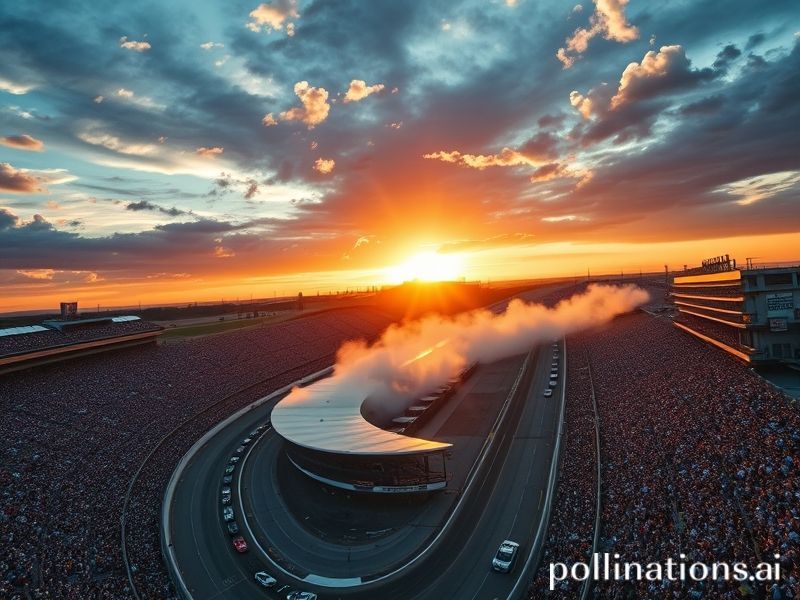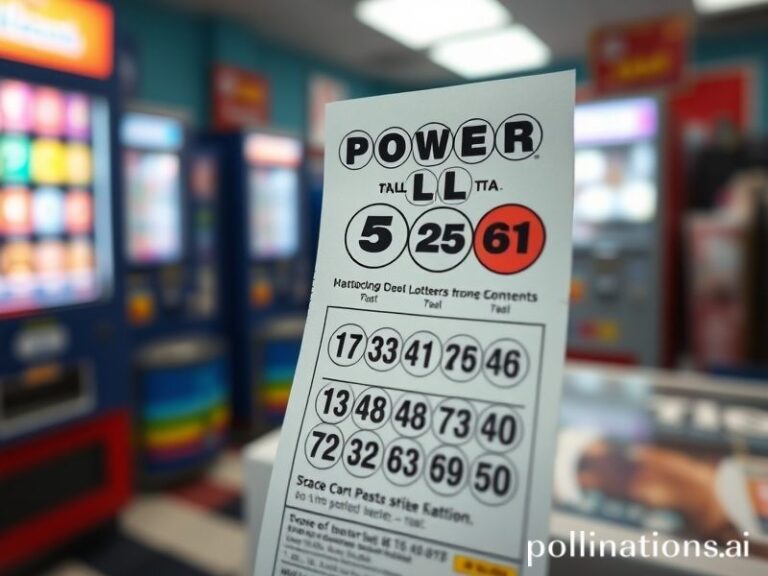Darlington: The Unassuming English Town Quietly Steering the Planet
Darlington: The Tiny English Town Accidentally Running the World While Pretending to Be Unremarkable
By Our Man in the North, nursing a lukewarm pint of bitter and existential dread
DARLINGTON, County Durham—Population 107,000, two Morrison’s car parks, and one nuclear reactor that glows just brightly enough to read the morning headlines. On paper, Darlington is the sort of place you pass on the East Coast Main Line while Googling “How to fake enthusiasm for York.” Yet, like that quiet flatmate who turns out to be laundering bitcoin for Moldovan oligarchs, Darlington has spent the last decade moonlighting as a geopolitical pivot point—while still fretting about the price of sausage rolls.
Let us begin, as all disasters now do, with supply chains. When the Ever Given wedged itself athwart the Suez Canal in 2021, the world suddenly remembered that 12 percent of global trade is a single badly-steered boat away from constipation. Darlington’s modest railway works—founded 1863, staffed by men who still call lunch “bait”—had already been quietly printing money refurbishing freight wagons for the Gulf, Africa, and any other region whose infrastructure policy is “pray nothing breaks.” Overnight, a town whose council once debated whether Aldi constituted culture became the West’s emergency plumber for global logistics. Cue German delegations arriving in hi-vis vests, nodding solemnly at Victorian turntables as if inspecting the Large Hadron Collider in clogs.
Meanwhile, 15 kilometers south, the Darlington Nuclear Plant—official name: Teesside, but nobody local bothers—continues to supply 1.3 GW of baseload power, enough to keep TikTok scrolling from Tromsø to Timbuktu. During Europe’s 2022 energy panic, when Germany was busy reclassifying coal as “transitional artisanal rock,” Darlington’s uranium pellets became the moral equivalent of caviar. British ministers who couldn’t pronounce “decommissioning” suddenly posed for photos in the turbine hall, promising “British atoms for British kettles,” while secretly exporting spare megawatts through under-sea cables to the Netherlands. The plant’s 1970s control room, all bakelite and cigarette nostalgia, now hosts cybersecurity experts flown in from Seoul to explain why you shouldn’t let the intern plug his iPhone into the reactor’s USB port.
Not content with powering and hauling the planet, Darlington has lately diversified into moral panic. The town’s modest mosque—capacity 400, minaret shorter than the adjacent Greggs chimney—was singled out by a visiting U.S. cable-news anchor as “a potential hotbed of northern jihad.” The resulting documentary featured slow-motion shots of rainy terraced houses, ominously subtitled “only 42 minutes from Leeds.” Darlington residents responded by organizing the world’s politest counter-protest, offering visiting reporters sticky buns and unsolicited directions to the real extremists: whoever keeps putting pineapple on pizza at the local Domino’s.
The broader significance? Darlington is a living experiment in how second-tier towns—those not sexy enough for spy novels yet too strategic to ignore—are becoming the actual sinews of late-stage globalization. While London and Washington argue over aircraft carriers, the leverage lies in places that can still fix a bogie, enrich a fuel rod, or host a data center cooled by the River Skerne. The Chinese delegation that arrived last spring barely glanced at Westminster’s latest white paper; they wanted to see the rail yard’s 5G-enabled axle sensors and confirm whether the local college could upskill welders in Mandarin.
Of course, none of this has improved the town’s self-esteem. Darlington’s tourism website still lists “the oldest Victorian railway clock still running on original ennui” as a highlight. Locals, when questioned about their newfound global importance, shrug the universal shrug of people who’ve seen governments mistake them for a photo opportunity and leave without fixing the potholes. “World’s run on places like us,” one retired fitter told me, wiping oil from his hands onto a copy of The Economist someone left in the café. “Shame nobody told the world.”
Conclusion: Darlington teaches us that influence today is less about capitals and more about capacitors—less summitry, more sump pumps. The town keeps the lights on, the trains rolling, and the nuclear waste politely cooling, all while insisting it’s nothing special. If that isn’t the perfect metaphor for our age of backstage power and front-stage chaos, I’ll eat my flat cap. Preferably with a side of chips and existential resignation.







